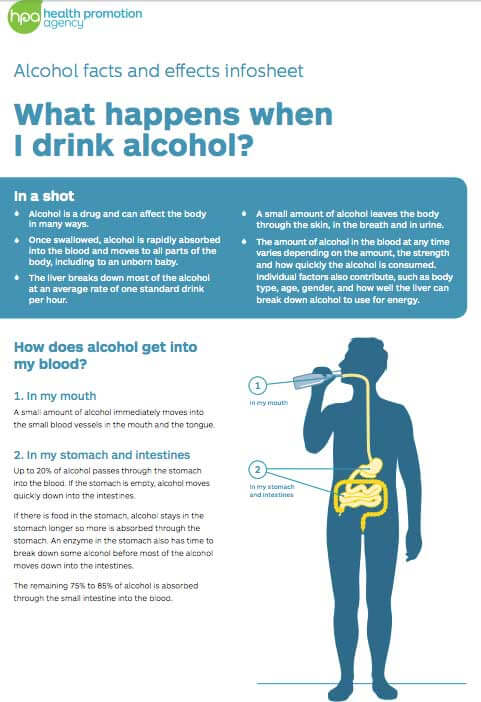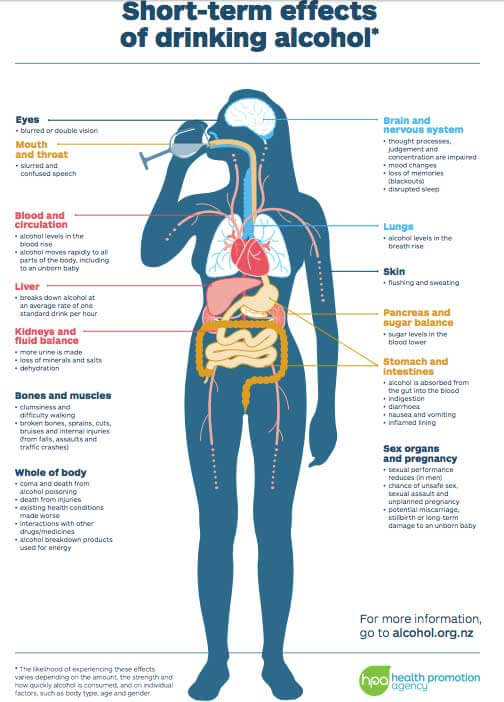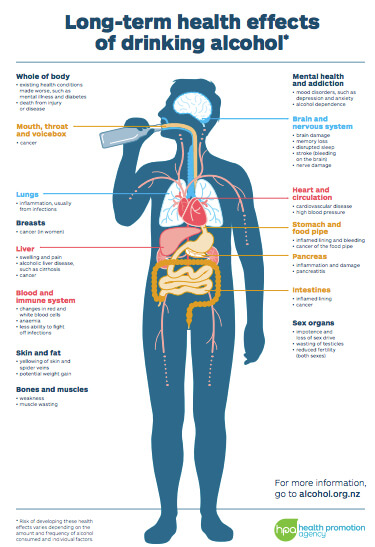What harm can alcohol cause?
Key points about alcohol and harmful drinking
- Alcohol is a leading cause of preventable death and morbidity globally and in Aotearoa New Zealand.
- Harmful consequences associated with alcohol use include health conditions and injuries, hospital admissions, deaths, road accidents and assaults.
- Alcohol is a key driver of social and health inequities especially for Māori, young people and lower socio-economic communities.
- No level of drinking is completely without risk.
- Alcohol consumption is associated with an increased risk of cancer, heart disease and many other life-threatening diseases.
- There is support available to help you to cut down or stop drinking.

Alcohol (ethanol or ethyl alcohol) is an addictive toxin and intoxicant, found in beer, wine and spirits. An addictive substance means that you find it hard to stop taking it once you have started. Toxin means it is poisonous to the human body in large amounts. Intoxicant means it causes intoxication or an altered state.
People respond to alcohol in individual ways, and the same amount of alcohol consumed can have varying effects on different people. Learn more about alcohol and its effect on your body.
Alcohol can cause short-term and long-term harm to you and others.
Short-term alcohol-related risks include:
- accidents and injuries including vehicle collisions and falls
- poor decision making that can result in things like unprotected sex, leading to unplanned pregnancy or sexually transmitted infections
- alcohol poisoning, resulting in vomiting, passing out and hangovers
- blackouts and memory loss
- aggressive behaviour leading to violence, abuse, criminal offending or assault.
People who binge drink (drink heavily over a short period of time) are more likely to behave recklessly and are at greater risk of being in an accident.
Long-term alcohol-related risks include:
- increased risk of developing serious health conditions including heart disease, stroke, liver disease and pancreatitis, and certain cancers including mouth, throat, oesophageal, breast and colorectal. Alcohol is identified as a class 1 carcinogen (known to cause cancer) putting it in the same risk category as smoking and asbestos.
- substance use disorders, characterised in part by withdrawal symptoms and an increase in tolerance
- ongoing effects of alcohol-related accidents, injuries or assault
- family, whānau and relationship difficulties
- financial and/or employment and/or housing difficulties
- an increase in likelihood or worsening of mental health symptoms, especially related to anxiety and depression.
Low risk is not no risk. Even when drinking within low-risk limits, a range of factors can affect your level of risk, including the rate of drinking, your body type or genetic makeup, your gender, existing health problems and whether you are young or an older person.
You can reduce your risk of alcohol-related harm by following the Te Hiringa Hauora | Health Promotion Agency's low-risk drinking advice(external link), which includes information on when it is safest not to drink. If you want to learn about young people and alcohol, see advice for parents on the alcohol page.
The Te Hiringa Hauora | Health Promotion Agency’s Is Your Drinking Okay? test can help you find out more about your level of risk from your drinking. Just complete the questionnaire and it will automatically add up your score and tell you what it means. It's that easy!
Take the test: Is your drinking okay?(external link)(external link)
If your drinking is causing problems for you, your family/whānau or friends, you may want to consider easing up. The following strategies may help you ease up on your drinking so that you can drink in a way that reduces the chance or significance/severity of harm to yourself or others.
- Record your drinking: Keep a diary of when, where and exactly how much you drink.
- Identify trouble spots: Look at the situations where you drank too much and try to identify whether there was a pattern to them. Are there particular people, places or emotions that trigger you to drink too much?
- Make a plan: Now you know when your drinking is problematic, you can make a conscious effort to stop it happening. Answer these questions: How much do you plan to drink? How long do you intend to drink for? What can you do to help yourself stick to your plan? Who can help you stick to your plan?
- Get support: Talk to loved ones, friends or whānau about your plan. This way they can help and support you in settings where there is alcohol present.
If you need support or treatment to reduce or stop your alcohol intake, a good place to start is to call the Alcohol Drug Helpline on 0800 787 797, visit the website(external link), or free text 8681 for confidential advice.
Trained counsellors are there to answer your call or text 24 hours a day, any day. You can choose to talk with a Māori or Pacific Peoples counsellor by calling these services:
- Māori line – 0800 787 798
- Pacific Peoples line – 0800 787 999
Discuss your drinking with a medical practitioner, especially if you are pregnant, and finding it difficult to stop drinking. They can help with checking out your physical health and directing you to someone who can help you.
There are lots of groups keen to help you with the resources, moral support and motivation to achieve this. Ask your whānau and friends to support you too.
Treatment for alcohol problems includes a range of approaches, such as 12-step support groups, counselling services that have individual or group appointments, online courses or residential programmes where you stay for several weeks. Learn more by following the links below:
- Find an alcohol and drug treatment service near you(external link)(external link)
- 12 step plan(external link) Alcoholics Anonymous
- Support for family and friends(external link) Al-Anon
- Kina Families and Addictions Trust(external link) Support for family, whānau and friends of people using alcohol and other drugs
- Living Sober(external link) Online support community
- Alcohol and drig support courses(external link) by Just a Thought, 3 CBT-based online courses for different stages you might be at: Thinking about change, Taking action or Getting back on track.
Employee assistance programme (EAP) services can also help. They are accessed through your employer, but you do not have to explain why you want to use them.
Apps reviewed by Healthify
You may find it useful to look as some alcohol use apps.
To find an alcohol or harmful drinking service within your area, use the location filter under the map (mobile view) or at the bottom of the search results (computer view).
Source: HealthPoint services directory. Used with permission.
Alcohol and drug addiction(external link) Health New Zealand | Te Whatu Ora
Alcohol use data and stats(external link) Ministry of Health, NZ, 2017
Concerned about someone’s drinking?(external link) Health Promotion Agency, NZ, 2012
Low-risk alcohol drinking(external link) Health Promotion Agency, NZ
Alcohol – body effects(external link) Health Promotion Agency, NZ
A guide to standard drinks(external link) Health Promotion Agency, NZ
Community treatment services(external link) Health New Zealand | Te Whatu Ora, 2024
Start your recovery(external link) US, 2018
NZ health survey 2017/18 – alcohol use(external link) Alcohol Healthwatch, NZ, 2018
Alcohol and cancer risk(external link) National Cancer Institute, US, 2021
Resources
What happens when I drink alcohol? (external link)Te Hiringa Hauora | Health Promotion Agency, NZ
Short-term effects of drinking alcohol(external link) Te Hiringa Hauora | Health Promotion Agency, NZ, 2018
Long-term effects of drinking alcohol(external link)Te Hiringa Hauora | Health Promotion Agency, NZ, 2018
Alcohol and older people – What you need to know(external link) Health Promotion Agency, NZ
Living well – life strategies for family, whānau and friends of people using alcohol and other drugs (external link)Kina Families and Addictions Trust, NZ
Research on older New Zealanders alcohol use [JPG, 49 KB] Health Promotion Agency, NZ, 2018
Gambling, alcohol and drugs [PDF, 544 KB] Matua Raki & Te Pou NZ, NZ English & Simplified Chinese [PDF, 506 KB], English & Traditional Chinese [PDF, 544 KB]
How alcohol affects your health and body [PDF, 383 KB] Matua Raki NZ 2020 Simplified Chinese [PDF, 383 KB], Traditional Chinese [PDF, 524 KB], Japanese [PDF, 534 KB], Korean [PDF, 533 KB]
Apps/tools
Is your drinking okay?(external link) Health Promotion Agency, 2017
Alcohol use apps
Brochures

Te Hiringa Hauora | Health Promotion Agency, NZ

Te Hiringa Hauora | Health Promotion Agency, NZ, 2018

Te Hiringa Hauora | Health Promotion Agency, NZ, 2017
Credits: Healthify Editorial Team
Reviewed by: Luisa Silailai, Programme Manager for Alcohol Harm Minimisation and accredited DAPAANZ Clinical Supervisor/Alcohol and other Drugs and Problem Gambling Clinician.
Last reviewed:
Page last updated:





